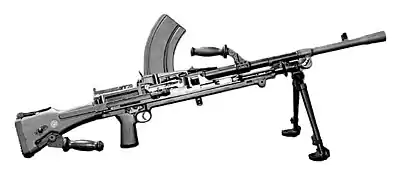Light machine gun
A light machine gun (LMG) is a light-weight machine gun designed to be operated by a single infantryman, with or without an assistant, as an infantry support weapon. LMGs firing cartridges of the same caliber as the other riflemen of the same combat unit are often referred to as squad automatic weapons.
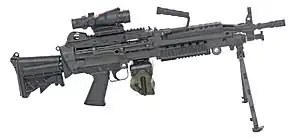
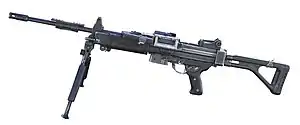

Characteristics
While early light machine guns fired full-powered rifle cartridges, modern light machine guns often fire smaller-caliber rifle cartridges than medium machine guns – generally the same intermediate cartridge fired by a service's standard assault rifle – and are usually lighter and more compact. Some LMGs, such as the Russian RPK, are modifications of existing designs and designed to share the same ammunition. Adaptations to the original rifle generally include a larger magazine, a heavier barrel to resist overheating, a more robust mechanism to support sustained fire and a bipod.
A light machine gun is also defined by its usage as well as its specifications: some machine guns – notably general-purpose machine guns – may be deployed either as a light machine gun or a medium machine gun. Deployed on a tripod and used for sustained fire, it is a medium machine gun; if deployed with a bipod with the operator in a prone position and firing short bursts, it is a light machine gun.
Light machine guns are also designed to be fired from the hip or on the move as a form of suppressive fire intended to pin down the enemy. Marching fire is a specific tactic that relies on this capability.
Lighter modern LMGs have enabled them to be issued down at the fireteam level, with two or three at the section/squad level.
Ammunition feed
Many light machine guns (such as the Bren gun or the M1918 Browning Automatic Rifle) were magazine-fed. Others, such as the Hotchkiss M1922, could be fed either from a belt/strip or from a box magazine. Modern light machine guns are designed to fire smaller caliber rounds and, as such, tend to be belt-fed (from a container attached to the gun) or from a detachable high-capacity drum magazine, but some, such as the FN Minimi, will also accept standard rifle magazine feeding as an auxiliary measure when belted ammunition has been exhausted.
History
In 1903, French military theorists noticed that the heavy machine guns of the day were of little use in infantry assaults. They determined that "the machine gun must learn to walk".[1] They researched the possibility of a light machine gun which could be carried by troops. A marching fire tactic was theorised, using incidental suppressive fire, with the advancing troops considered a deadlier threat than the un-aimed bullets, causing the enemy to fall back. The prototype guns were not approved for production, and none were in service when World War I began.[1] The French quickly brought the prototypes to mass production to boost the firepower of advancing infantry.
By the end of World War II, light machine guns were usually being issued on a scale of one per fire team or squad, and the modern infantry squad had emerged with tactics that were built around the use of the LMG to provide suppressive fire.
Selected examples
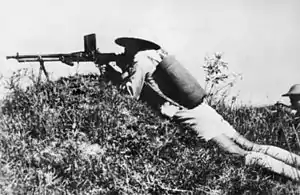
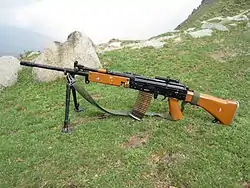
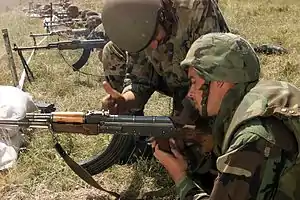
The following were either exclusively light machine guns, had a light machine gun variant or were employed in the light machine gun role with certain adaptations.
| Model | Country of origin | Design date | Caliber(s) | Weight (base model) | Feed system | Rate of fire (rounds/min) | Model variants |
|---|---|---|---|---|---|---|---|
| Madsen machine gun | 1883 | Various | 9.07 kg (20.0 lb) | Box magazine | 450 | ||
| Chauchat (Fusil-Mitrailleur Mle 1915 'CSRG') | 1907 | 8mm Lebel | 9.07 kg (20.0 lb) | Magazine | 240/360 | ||
| Hotchkiss M1909 Benét–Mercié | 1909 | 8mm Lebel .303 British .30-06 Springfield |
12 kg (26.5 lb) | Feed/belt | 400–600 | ||
| Bergmann MG15 nA Gun | 1910 | 7.92×57mm Mauser | 12.9 kg (28.4 lb) | Belt | 500–600 | ||
| Vickers-Berthier | 1910 | .303 British | 24.4 kg (53.8 lb) | Box | 450–600 | ||
| Lewis Gun | 1911 | .303 British .30-06 Springfield 7.92×57mm Mauser |
13 kg (28.7 lb) | Drum magazine | 600 (cyclic) | ||
| Huot automatic rifle | 1916 | .303 British | 5.9 kg (13.0 lb) | Drum magazine | 155/475 | ||
| M1918 Browning Automatic Rifle | 1917 | .30-06 Springfield 6.5×55mm 7.92×57mm Mauser |
8.8 kg (19.4 lb) | Box magazine | 650 (cyclic) | Wz. 1928 (Poland) | |
| Hotchkiss M1922 | 1922 | Various | Feed/magazine | 450 | |||
| Type 11 light machine gun | 1922 | 6.5×50mm Arisaka | 10.2 kg (22.5 lb) | Hopper magazine, 30 rounds | 500 (cyclic) | ||
| ZB vz. 26 | 1923 | 7.92×57mm Mauser | 10.5 kg (23.1 lb) | Box magazine | 500 | ||
| FM-24/29 | 1924 | 7.5×54mm French | 9.1 kg (20.1 lb) | Box magazine | 450 (cyclic) | ||
| Maxim-Tokarev | 1924 | 7.62×54mmR | 12.9 kg (28.4 lb) | Belt | |||
| Lmg 25 | 1925 | 7.5×55mm Swiss | 8.65 kg (19.1 lb) | Box magazine | ≈500 | ||
| Lahti-Saloranta M/26 | 1925 | 7.62×53mmR | 9.3 kg (20.5 lb) | Magazine | 450–550 | ||
| Degtyaryov machine gun | 1927 | 7.62×54mmR | 9.12 kg (20.1 lb) | Various | 550 | ||
| Mendoza RM2 | 1928 | 7×57mm Mauser .30-06 Springfield |
6.3 kg (13.9 lb) | Box magazine | 450–650 | ||
| Breda 30 | 1930 | 6.5×52mm Mannlicher–Carcano | 10.6 kg (23.4 lb) | Stripper clip fed, internal magazine | 500 (cyclic) | ||
| ZB vz. 30 | 1930 | 7.92×57mm | 9.1 kg (20.1 lb) | Box magazine | 550–650 | ||
| Bren | 1935 | .303 British | 10.35 kg (22.8 lb) | Various | 500–520 | ||
| Type 96 light machine gun | 1936 | 6.5×50mm Arisaka | 9 kg (19.8 lb) | Box magazine | 450 (cyclic) | ||
| Type 99 light machine gun | 1939 | 7.7×58mm Arisaka | 10.4 kg (22.9 lb) | Box magazine | 800 | ||
| M60E3/E4 | 1950s | 7.62×51mm NATO | 8.51 kg (18.8 lb) | Belt fed | 550 (cyclic) | ||
| Stoner 63 | 1960s | 5.56×45mm NATO | 5.3 kg (11.7 lb) | Drum or box magazine | 1000 (cyclic) | ||
| Colt Automatic Rifle | 1970s | 5.56×45mm NATO | 5.78 kg (12.7 lb) | Drum or box magazine | 750 (cyclic) | Diemaco LSW (CAN) | |
| L86 LSW | 1970s | 5.56×45mm NATO | 6.58 kg (14.5 lb) | Box magazine | 775 (cyclic) | ||
| FN Minimi | 1974 | 5.56×45mm NATO (standard) *7.62×51mm NATO |
6.85 kg (15.1 lb) | Belt fed or box magazine | 1150 (cyclic) | M249 Squad Automatic Weapon (USA) MK 46 machine gun (USA) | |
| CETME Ameli | 1974 | 5.56×45mm NATO | 5.3 kg (11.7 lb) | Belt fed | 1200 (cyclic) | MG82 (Spain) | |
| Ultimax 100 | 1977 | 5.56×45mm NATO | 4.75 kg (10.5 lb) | Drum or box magazine | 600 (cyclic) | ||
| Vektor Mini-SS | 1977 | 5.56×45mm NATO | 8.26 kg (18.2 lb) | Belt fed | 900 (cyclic) | ||
| Steyr AUG H-BAR | 1977 | 5.56×45mm NATO | 3.9 kg (8.6 lb) | Box magazine | 750 (cyclic) | ||
| Negev | 1985 | 5.56×45mm NATO (standard) 7.62×51mm NATO |
7.4 kg (16.3 lb) | Belt fed or magazine | 1150 (cyclic) | ||
| Heckler & Koch MG4 | 1990s | 5.56×45mm NATO | 8.55 kg (18.8 lb) | Belt fed | 885 (cyclic) | ||
| Heckler & Koch MG36 | 1990s | 5.56×45mm NATO | 3.83 kg (8.4 lb) | Drum or box magazine | 750 (cyclic) | ||
| INSAS LMG | 1990s | 5.56×45mm NATO | 6.7 kg (14.8 lb) | Box magazine | 650 (cyclic) | ||
| Pecheneg machine gun | 1990s | 7.62×54mmR | 8.7 kg (19.2 lb) | Belt fed or box magazine | 700 | ||
| SAR-21 LMG | 1996 | 5.56×45mm NATO | 3.82 kg (8.4 lb) | Box magazine | 650 (cyclic) | ||
| Ares Shrike 5.56 | 2000s | 5.56×45mm NATO | 3.4 kg (7.5 lb) | Belt fed or magazine | 800 (cyclic) | ||
| Type-81 LMG | 2008 | 7.62×39mm | 5.15 kg (11.4 lb) | 100-round drum or 30-round STANAG | 750 (cyclic) | BD-08 LMG (Bangladesh) | |
| M27 IAR | 2008 | 5.56×45mm NATO | 3.6 kg (7.9 lb) | Drum or box magazine | 640 (cyclic) | ||
See also
References
- "Fusil mitrailleur Chauchat. FM modèle 1915 C.S.R.G." Les mitrailleuses du premier conflit mondial (in French). mitrailleuse.fr. 2003. Retrieved December 18, 2011.
